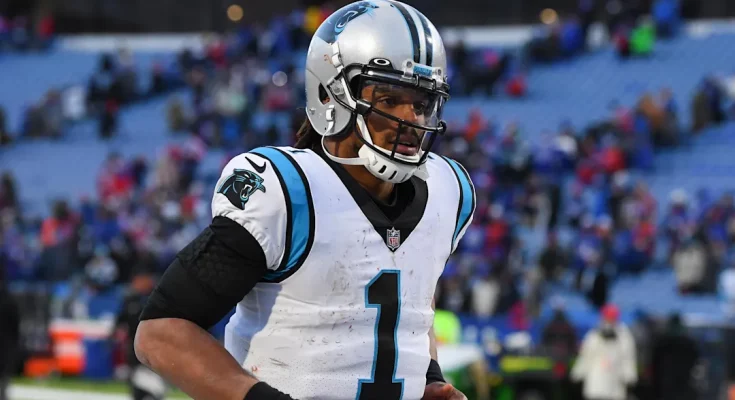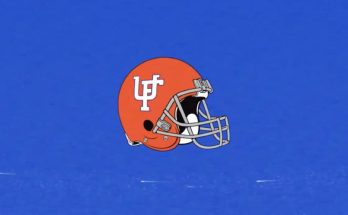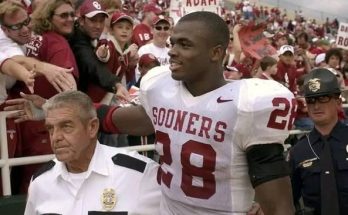When Auburn University officially announced that they would be retiring Cam Newton’s iconic No. 2 jersey, it was more than just a symbolic gesture. It was a statement about legacy, impact, and the rare type of player who transcends wins, statistics, and championships. For Auburn fans, Newton was not simply a quarterback—he was the definition of greatness in its most electric form. His 2010 Heisman-winning season culminated in a national championship that redefined Auburn football history. In recognition, Auburn did the only thing fitting: they ensured that no other player would ever wear his number again. Now, as the Carolina Panthers look at their own history, many believe it is time for them to follow suit and retire Newton’s famous No. 1 jersey, permanently sealing his place in the team’s story.
Newton’s journey to becoming an icon in Carolina began in 2011 when the Panthers drafted him No. 1 overall in the NFL Draft. Coming off that historic run at Auburn, Newton was expected to carry a struggling franchise into the future. Few rookies face that level of pressure, and even fewer respond in the way Newton did. His NFL debut was an immediate shock to the league: 422 passing yards in his very first game, a feat no rookie quarterback had ever accomplished. He set the tone for what would become one of the most dynamic, polarizing, and entertaining careers in Panthers history. He brought something no one else had—a combination of size, power, charisma, and unmatched flair that made the Panthers must-watch television.
Over his nine seasons in Carolina, Newton defined an era. He didn’t just play quarterback—he redefined the position. At 6’5”, 245 pounds, Newton was as dangerous running the ball as he was throwing it. He bulldozed linebackers, leaped over defensive lines, and turned red-zone opportunities into celebrations that became trademarks of his persona. His “Superman” touchdown celebration became more than just a signature move—it became a cultural symbol tied to both the Panthers and the city of Charlotte. Children mimicked it in youth leagues, and fans in Bank of America Stadium erupted whenever he pulled open his jersey after scoring.
Of course, it wasn’t just showmanship. Newton’s resume is more than worthy of permanent recognition. He is the Panthers’ all-time leader in passing touchdowns (186) and rushing touchdowns by a quarterback (58). His MVP season in 2015 remains one of the most dominant quarterback seasons in NFL history. Newton threw for 35 touchdowns and ran for 10 more, leading Carolina to a 15-1 record and a Super Bowl appearance. That magical season, though it ended in defeat to the Denver Broncos, remains the closest the Panthers have come to ultimate glory since their inception. To this day, many Panthers fans look back at 2015 as the peak of the franchise, and Newton was the undeniable face of that run.
But Newton’s legacy in Carolina is not just about numbers or even wins—it’s about cultural impact. For years, the Panthers were a small-market team often overshadowed by flashier franchises. Newton changed that. He made Carolina cool. He drew national attention, he made the Panthers a household name, and he gave the team an identity that resonated with fans across the country. The Panthers became known as “Cam’s team,” and in many ways, they still are. Even now, years after his last snap in a Panthers uniform, the shadow of Newton’s No. 1 looms large. It’s not just another number—it’s synonymous with him.
That is why Auburn’s decision to retire Newton’s number should serve as an example. If a program with a long, storied history of Heisman winners, legendary coaches, and multiple championships views Newton’s legacy as untouchable, then Carolina should feel the same. After all, Newton is the closest thing to a franchise cornerstone the Panthers have ever had. Other greats like Steve Smith Sr., Luke Kuechly, and Julius Peppers are immortal in Panthers history, but Newton gave the team something different—star power on a global scale. He elevated the Panthers from regional relevance to international conversation.
Retiring a number is not something that should be done lightly, and in the NFL, it’s even rarer. Most teams hesitate to retire numbers because rosters are large, and the pool of numbers is finite. But the truly great ones—those who left an undeniable mark on a franchise—deserve the honor. For Carolina, Newton is clearly in that category. No matter how many quarterbacks come through the Panthers organization in the future, none will ever carry the aura or legacy that Newton brought with him. To allow another player to wear No. 1 would dilute its significance and, in a sense, rewrite history.
The timing also makes sense. The Panthers are in the midst of a rebuild, searching for their new identity under a young quarterback in Bryce Young. Retiring Newton’s number now would not just be a nod to the past but also a signal to the future. It would be the organization saying: this is what greatness looks like, and this is the standard we aspire to again. Young and others could draw inspiration from the shadow of Newton—not in pressure to replicate him, but in understanding what is possible when talent, leadership, and belief align.
Some might argue against it, pointing to Newton’s injuries in the later years of his career or the fact that he never won a Super Bowl. But if championships were the only measure of legacy, countless all-time greats would be overlooked. Dan Marino never won a Super Bowl, yet the Miami Dolphins retired his number without hesitation. Barry Sanders never won a Super Bowl with the Detroit Lions, yet his No. 20 is untouchable. Newton belongs in that same conversation. What he gave Carolina is irreplaceable and deserves permanent acknowledgment.
There is also an emotional side to this. Cam Newton loved Carolina and embraced the city of Charlotte in ways that went beyond football. His community involvement, charitable efforts, and constant engagement with fans endeared him to people far beyond the gridiron. He wasn’t just the quarterback—he was an icon who connected with the community on a personal level. His Thanksgiving dinners for underprivileged families, his presence at youth events, and his commitment to inspiring young athletes demonstrated that his impact stretched beyond Sunday afternoons. Retiring his jersey would honor not just the athlete, but the man who gave so much to the city.
Auburn’s decision adds extra weight to the argument. For Newton, Auburn was the beginning of his legend, and Carolina was where it grew into something even larger. To see his number retired in college but not in the NFL franchise that defined his professional identity feels incomplete. It would be almost like closing a book halfway through. The Panthers have the opportunity to complete the story and to give fans, and Newton himself, the closure and recognition that he deserves.
Fans have long debated the Panthers’ Mount Rushmore of players. Steve Smith Sr. is often considered the greatest wide receiver in franchise history. Luke Kuechly is one of the greatest linebackers the NFL has ever seen. Julius Peppers was a defensive terror whose career spanned decades. Yet, when the conversation turns to the face of the franchise—the player most synonymous with Carolina—it’s hard to argue with Newton being that figure. He was Superman in teal and black, and that image remains burned into the memory of the fan base.
In the years since his departure, the Panthers have struggled to find consistency at quarterback. The revolving door of passers has only highlighted how much Newton meant. His presence wasn’t just about stats—it was about belief. When Newton was under center, the Panthers always felt like they had a chance. That kind of confidence is rare, and it’s something Carolina hasn’t truly experienced since. Retiring his number would serve as a reminder of the heights the franchise once reached and the standard they can strive toward again.
There is also an argument to be made for timing. Newton is not far removed from his playing days, and his story with Carolina is still fresh in fans’ minds. Waiting too long risks the moment losing its emotional resonance. Acting now, while Newton’s legacy remains a vivid part of Panthers culture, ensures that the honor carries maximum impact. Imagine the energy in Bank of America Stadium the day the Panthers announce that No. 1 will never be worn again. The fans, the players, the city—it would be a celebration not just of Newton, but of what he represents.
Ultimately, retiring Cam Newton’s No. 1 jersey would not just be about honoring an individual. It would be about affirming a period in Panthers history that defined the franchise’s identity. It would be about acknowledging the unique connection between a player, a team, and a city. It would be about showing future generations what it means to wear the Panthers uniform. Auburn has already made its statement about Newton’s greatness. Now it’s time for the Carolina Panthers to do the same.
Cam Newton was never just a quarterback. He was the Panthers’ heartbeat, their identity, their Superman. The legacy he left behind is undeniable, and his number—like his name—should stand alone in Carolina history. For fans who lived through his reign and for those who will look back years from now, the No. 1 jersey should forever symbolize Cam Newton, the man who carried a franchise on his shoulders and made the Carolina Panthers matter on the biggest stage. The Panthers have the chance to write this final chapter in Newton’s story with the franchise, and the time to do it is now. Retire the number. Make it official. Let Superman’s legacy fly forever.



